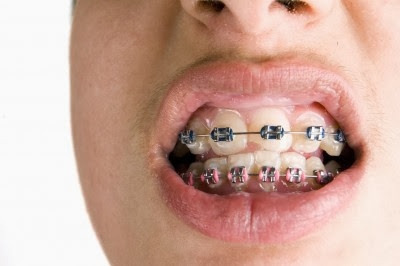One thing people worry about when they are advised to have braces is oral hygiene. Brushing your teeth is normally very simple to do, but when you have big pieces of metal on your teeth, this surely becomes more difficult. The good news is that most people learn to brush their teeth with braces very quickly. You will soon get used to wearing your braces and keeping them clean.
Your oral hygiene routine
Good oral hygiene is important for everyone, but if you have braces, you may have to make an extra effort to keep your mouth clean. Braces do not directly cause oral hygiene problems, but they do increase your risk of decay and gum disease because the bands and brackets tend to attract plaque and food debris.
If you have braces, it’s particularly important that you clean your teeth on a regular basis. Often, food can become trapped in the brackets, so it may be a good idea to carry a brush with you and brush after every meal. Always wait at least 45 minutes before you brush. This is important as saliva needs time to break down the starchy sugars in some foods. Brushing straight away can weaken and damage surface tooth enamel. Saliva also helps to keep teeth strong as it contains high levels of fluoride, calcium and phosphate ions.
When you brush, it’s important to follow your dentist’s advice - cover all areas of your mouth and ensure that you brush for at least 2 minutes each time. If you struggle to stick to your dentist’s recommendations and have no concept of how long 2 minutes last, try brushing along to a song, as most songs are around 3 minutes long.
Cleaning your brace
When you have a brace fitted, your orthodontist will explain how to keep it clean and show you how to brush your teeth. You can buy specially designed cleaning products and brushes for use with braces, which are easier to use than traditional brushes.
Your diet will also affect your braces and your oral health and it is likely that your dentist will advise you to avoid certain foods. All patients are advised to steer clear of sugary and acidic foods, which erode the protective tooth enamel. It may be beneficial to avoid chewy foods such as gummy and sticky sweets and very hard foods, such as bon bons, as these may stick to the braces or damage them.
If you have concerns about cleaning your teeth or you are worried about developing gum disease or decay when you have braces fitted, talk to your dentist or orthodontist.
Dental appointments
It’s important for everyone to see their dentists on a regular basis for a routine check-up but if you have braces, you may be advised to see your dentist more frequently. This allows them not only to check on the progress of your treatment, but also to keep an eye on your oral health and treat any problems before they get worse.
Advantages of braces
Being told that you need braces is probably not going to the best moment of your life, but braces are a really effective treatment and you will be glad that you had them in the long-run. You can use braces to rectify bite problems that affect the function of your teeth and jaws, as well as making your smile look more attractive.
Disclaimer: This article is contributed by a Guest Blogger. Ping of Health does not give any warranty on accuracy, completeness, functionality, usefulness or other assurances as to the content appearing in this article. Ping of Health disclaims all responsibility for any losses, damage or personal injury suffered directly or indirectly from reliance on such information.







